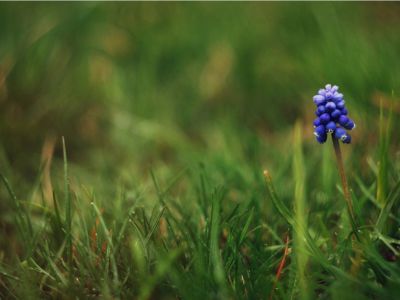About Grape Hyacinth Seed Propagation
You would have to look far to find grape hyacinth flower seeds because the bulbs are generally sold for faster color displays in the garden. All you really need for Muscari seed planting is a spent crop of the plants in your landscape or your neighbor’s lot. Harvest the seeds from finished flowers that have dried on the plant and sow them after a chilling period. It takes several years for the seeds of Muscari to mature enough to produce flowers. Due to this lengthy wait, most of us simply purchase grape hyacinth bulbs and install them in fall for spring blooms. Patient gardeners can save a buck by procuring grape hyacinth seed pods and removing the three seeds produced by each flower. The ripe pods will swell once the seed is ripe and split open and it is an easy project to squeeze them out. Once sown, plants will result but they won’t bloom for 2 to 3 years. The delicate strappy foliage will still provide coverage for exposed soil areas and support moisture retention and weed suppression. In time, you will have a carpet of the tiny purple clustered flowers.
When to Plant Grape Hyacinth Seeds
There are two ways to plant grape hyacinth seeds. You can start them indoors or plant them outside in a cold frame. If you are starting plants outside and using nature to provide the required chilling period, fall is when to plant grape hyacinth seeds. Muscari seed planting that takes place indoors can commence at any time after you have chilled the seeds in the refrigerator for at least three months. This mimics the natural chilling period the seeds would have received over winter. Grape hyacinth freely reseeds itself, so some gardeners clip off the dead flowers immediately to prevent spreading plants. Avail yourself of this tendency amongst your friends and family and try growing your own grape hyacinth flower seeds.
Muscari Seed Planting
After you have taken the seed from grape hyacinth seed pods, you can plant them immediately in cold frames outside. Use well-draining soil in small pots or flats. Sow seeds on the surface of the planting medium with just a light scatter of soil to hold seed in place. Water lightly. Keep the soil moderately moist but not soggy, watering sparingly in winter. Open the lid of cold frames in spring and let the little plants acclimate to outside conditions. You can continue to grow them in the cold frame or transplant them carefully the next spring. Start seeds indoors in flats after chilling in late winter to early spring. Cover the flat with a clear lid until you see the little sprouts, generally in 6 to 8 weeks. Remove the cover and keep plants lightly moist in a brightly lit area. Transplant them after hardening off when they are a year old and soil is workable. In another year, you should see the vividly colored, tiny bluebells carpeting your garden beds.
